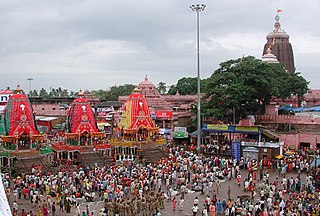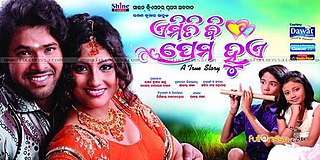
Ratha Yatra is a Hindu festival associated with Lord Jagannath held at Shri Kshetra Puri Dham in the state of Odisha, India. It is the oldest Ratha Yatra, whose descriptions can be found in Brahma Purana, Padma Purana, and Skanda Purana and Kapila Samhita. Rath Yatra or Jatra is the celebration of the Lord Jagannath, who is believed to be the Lord of Universe's journey towards his aunt's house.

The Gajapati Empire was an empire established by the Suryavamsa dynasty who were a medieval Hindu dynasty from the Indian subcontinent, which originated in the region of Trikalinga from 1434 to 1541 CE and succeeded the reign of the Eastern Gangas. Under Kapilendra Deva, Gajapatis became an empire stretching from the lower Ganga in the north to the Kaveri in the south.
Laxmisagar (ଲକ୍ଷ୍ମୀସାଗର) is a famous place in Bhubaneswar, the capital of Odisha. Etymologically the name is derived from the words "Laxmi", meaning the Hindu Goddess of Wealth, and "Sagar", which in Sanskrit means the sea or ocean. Laxmisagar is famous for the Central Jail, which is one of the biggest jails in Odisha. Many big names including well-known political prisoners and notorious criminals have spent time in the Central Jail at Laxmisagar. The open space in front of the jail has been a place for film shooting, where many famous imprisonment and jail-break scenes have been videographed in a great number of Oriya films.
Odisha is one of the 28 states of India, located in the eastern coast. It is surrounded by the states of West Bengal to the north-east, Jharkhand to the north, Chhattisgarh to the west and north-west, Andhra Pradesh to the south and south-west. Odia is the official and most widely spoken language, spoken by 33.2 million according to the 2001 Census. The modern state of Odisha was established on 1 April 1936, as a province in British India, and consisted predominantly of Odia-speaking regions. April 1 is celebrated as Odisha Day.

The Odia film industry, colloquially known as Ollywood, is the Odia language Indian film industry, based in Bhubaneshwar and Cuttack in Odisha, India. The name Ollywood is a portmanteau of the words Odia and Hollywood.
Seeta Bibaha (1936) was the first Oriya film directed by Mohan Sundar Deb Goswami; it presented the marriage of Lord Rama to Sita, based on the epic story Ramayana. The film starred Makhanlal Bannerjee, Mohan Sundar Deb Goswami, Krishnachandra Singh, and Prabhavati. It premiered 28 April 1936 at the Laxmi Talkies of Puri. Sita Bibaha was the first complete Oriya film and an important part of the struggle for a manifestation of Oriya cultural identity in celluloid form. The film was a commercial success. The two-hour movie was subsequently released at Cinema Palace in Cuttack. It also drew numerous crowds at several touring assignments such as the "Radhakishen Chamelia Touring Cinema". The second Oriya film was produced in 1949.
Lalita is a 1949 Indian folklore Oriya film directed by Kalyan Gupta.

Paagal Premi is a 2007 Indian Odia-language film directed by Hara Patnaik. This is a remake of Telugu hit movie Arya (2004).

Mihir Kumar Das was an Indian actor who worked in Odia language films. He had received several awards, notably Best Actor for his films Laxmi Pratima in 1998 and Pheria Mo Suna Bhauni in 2005 Best Supporting Actor award for his films Rakhi Bandhili Mo Rakhiba Mana in 2002 and Prema Adhei Akhyara and Best Comedian award for Mu Tate Love Karuchhi in 2007 from the Odisha state government.

'Suramani' PanditRaghunath Panigrahi was an Odissi music Guru, vocalist, composer and music director. He is most known for his renditions of Jayadeva's Gita Govinda and his vocal support for his wife, the Odissi danseuse Sanjukta Panigrahi. Raghunath belonged to a family associated with Odissi music for centuries, members of which were 19th-century Odissi poet-composer Sadhaka Kabi Gourahari Parichha and Gayaka Siromani Apanna Panigrahi who was the royal musician (raja-sangitagya) of Paralakhemundi. He started his musical training from his father Pt Neelamani Panigrahi, who had been collecting traditional Odissi melodies of the Gita Govinda from the Jagannatha Temple of Puri. Later, Raghunath continued learning Odissi music under Pt Narasingha Nandasarma and Pt Biswanatha Das. He was widely known as 'Gitagobinda Panigrahi'.
Bijay Mohanty was an Indian actor of Odia Cinema. He was honored a National Film Award.

Sanju Aau Sanjana is a 2010 Odia film screenplay & directed by Ashok Pati with dialogue by Rajaniranjan, produced by Lutu Mohanty, and starring Babushan Mohanty, Parijaat, and Mihir Das. It is a remake of the Telugu film Parugu starring Allu Arjun, Sheela, and Prakash Raj.
Suryamukhi is a 1963 Oriya film directed by Prafulla Sengupta.
Sindhu, known by her stage name Sindhu Loknath, is an Indian actress and model. She made her debut in films, with a cameo role in Parichaya (2009). She is recognized for her performances in Lifeu Ishtene (2011), Drama (2012), Case No. 18/9 (2013) and Love in Mandya (2014).
Kie Kahara (1968) is an Odia film directed by Nitai Palit. The film reflects the socio-economic conflicts of the declining Zamindar families, which were struggling to keep up social status with great difficulty.

Luchakali is an Oriya drama and thriller film released on 30 March 2012. it features Babushan, Shriya Jha, Samaresh Routray and Ajit Das in key roles with original music by Anbu Selvam. It is partially inspired by Hollywood thriller Sleeping with the Enemy.

Emiti Bi Prema Hue is a 2012 Oriya romantic drama film directed by Nishikant Dalabehera. Sabyasachi Mishra, Riya Dey and Mihir Das played the lead cast. The film released on 10 February 2012.

Md. Sikandar Alam was a playback singer in Odisha film industry. He is sometimes called the Salabega of modern Odisha.
Manimala Devi was an Indian Odia film actress. Devi was born in the Bilibasi village of Cuttack, and stepped into the film world at the age of nine. She never went to school. In 1945 she started to act in the Annapurna theatre of Cuttack.

Nirmala Mishra was an Indian singer of predominantly Odia and Bengali film songs. She also sang popular Assamese songs, most notably "Ki Naam di Matin". She was a recipient of the Sangeet Sudhakar Balakrushna Das Award as an honour for her lifetime contribution to Odia music.











